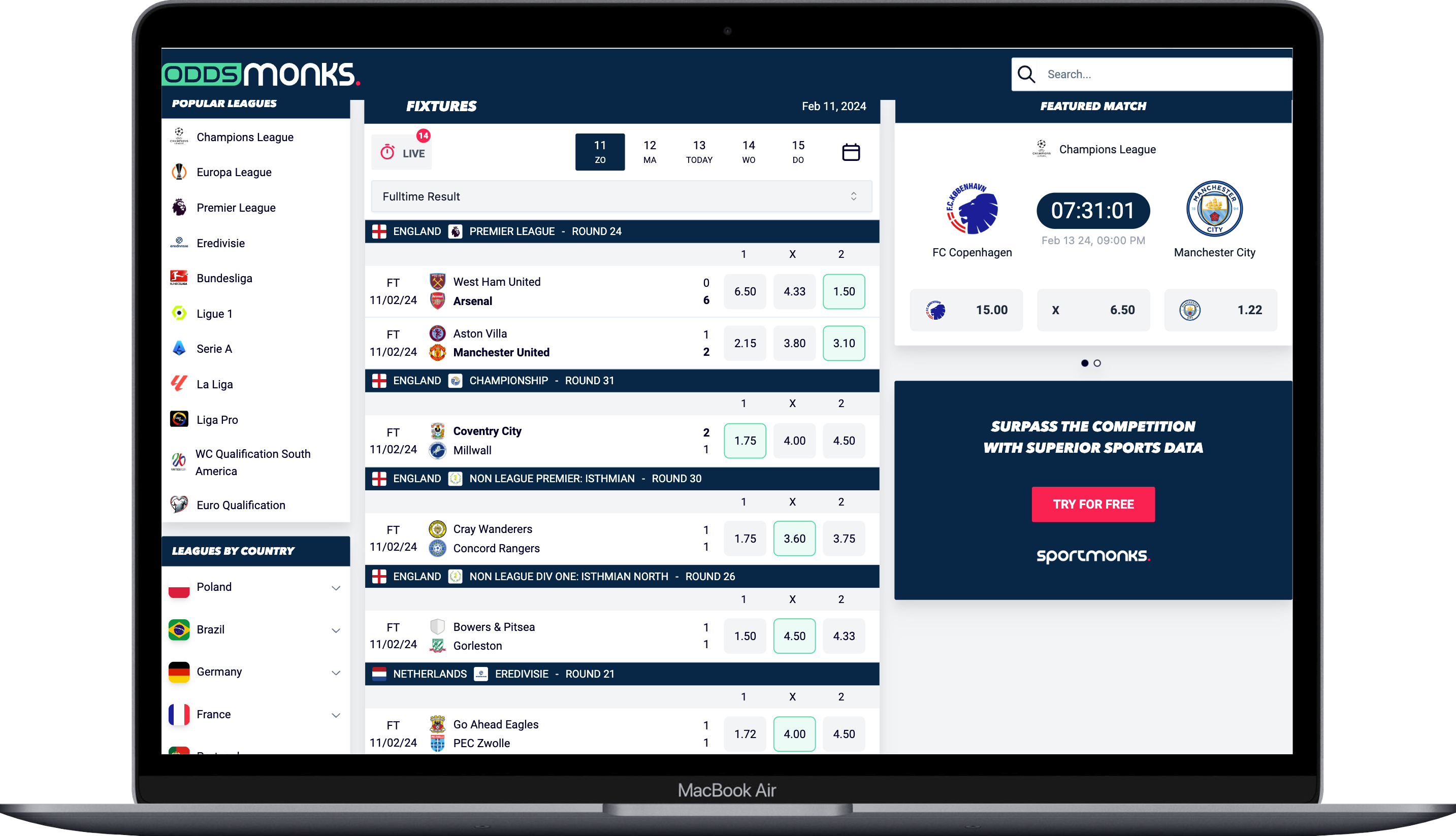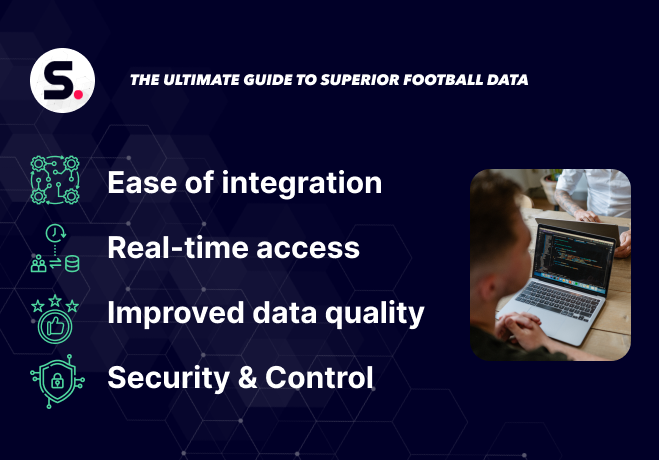
Contents
What if we told you that Sports Data APIs are actually the perfect solution for tedious and error-prone manual data entry, inconsistent data sources and limited data access? All frustrating hours of manual data entry can be automated via a Sports Data API. Your data can be consistent and reliable if you use the right data provider with the right Sports Data API. And if you have the right provider (one that is innovative), you can say goodbye to playing catch up with your competitors. You will be ahead instead of behind the others.
With the right Sports Data API, you can effortlessly access comprehensive sports data, leverage the latest technologies for superior sports analytics, and integrate real-time sports data into sports applications to enhance the user experience for all app users.
You assumed APIs require advanced programming skills and are way too expensive for small projects? Do you think free data sources were sufficient for basic needs? Wrong. With a custom plan at Sportmonks, you can get comprehensive data for affordable pricing. Besides that, the API is completely set up to be as developer-friendly as possible, so even with basic programming skills, you will be able to utilise our Sports Data APIs. Okay, in some cases, free data sources might be sufficient, but if you want to take your application to the next level, our Sports Data APIs are here up for grasp. The best part? You can try it out for free with a 14-day free trial.
What is a Sports Data API?
Oops, we didn’t explain what a Sports Data API is now, did we? Let’s rectify this right away.
According to RapidAPI (one of our partners), a Sports Data API “is a programming interface that connects applications, systems, and platforms to sports data. They search for information, verify, store, and regularly update sports data for accurate information.”
API stands for Application Programming Interface. AWS states: “In the context of APIs, the word Application refers to any software with a distinct function. Interface can be thought of as a contract of service between two applications. This contract defines how the two communicate with each other using requests and responses.”
So, in ordinary English, Sports Data APIs communicate with applications or websites. They can deliver Sports data at any point in time. This comes in really handy when you consider sports to be really dynamic and data to be changing continuously, don’t you think?
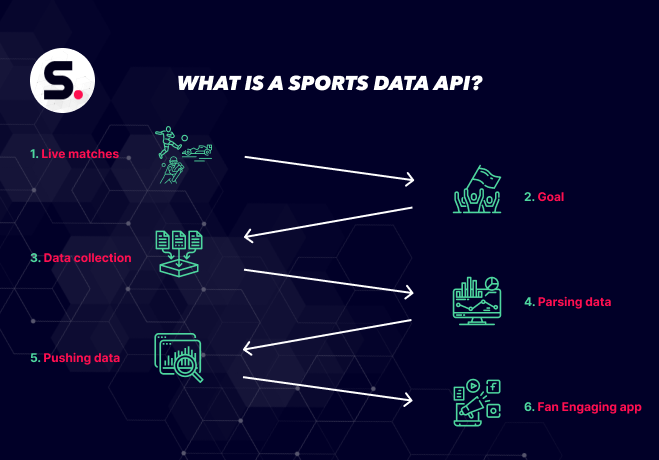
What are traditional sports data collection methods?
Ever feel like getting old? Well, not too long ago, the scouts were writing everything down with pen and paper. Yes, they were literally tally peating, maintaining detailed archives and records to keep track of performances and statistics. They clicked on their stopwatch to keep track of time—you know, things that feel like ancient times, right? When the computer came out, obviously, data was implemented in Excel and similar tools. But when APIs came to exist, things changed significantly.
How Sportmonks and APIs, in general, revolutionise data accessibility
Sportmonks’ goal is to make data available, accessible and affordable for everyone. Why should data be available only for the big companies? No way, not any more! Sportmonks wants to stop that trend! For an affordable price, we offer quality data via our APIs.
APIs have revolutionised the way businesses, developers and users interact with data.
 Ease of integration
Ease of integration
APIs provide a standardised way for software systems to communicate. Standardising the integration processes allows systems to connect seamlessly.
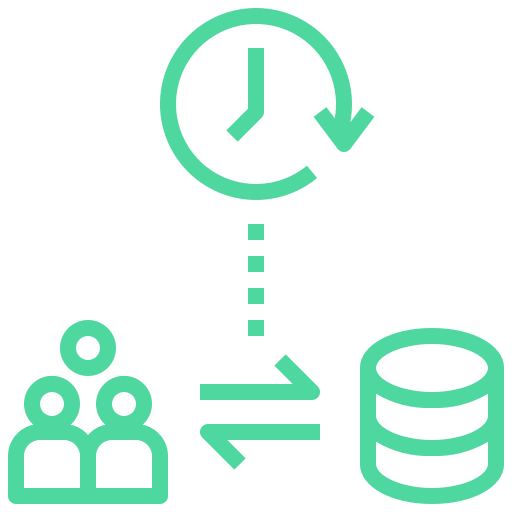 Real-time access
Real-time access
This real-time capability is crucial for industries like finance, e-commerce, and sports, where timely data is vital for decision-making and user experience.
 Scalability
Scalability
APIs enable scalable data access and management. Businesses can handle large volumes of data and high user traffic more efficiently by leveraging APIs, as they allow for distributed data handling and load balancing across multiple servers.
 Customisation and flexibility
Customisation and flexibility
Our Sports APIs offer customisation and flexibility by allowing developers to access only the specific data they need in the required format. This granular level of control makes it easier to build tailored applications and services.
 Automation
Automation
APIs allow for the automation of repetitive tasks and workflows. For example, businesses can automate data retrieval, processing, and reporting, which increases efficiency and reduces the risk of human error.
 Data accessibility across platforms
Data accessibility across platforms
APIs make data accessible across various platforms, including web, mobile, and desktop applications. This cross-platform accessibility ensures that users can access data from any device, enhancing the overall user experience.
 Improved data quality and consistency
Improved data quality and consistency
By centralising data access through APIs, organisations can ensure data consistency and quality. APIs help maintain a single source of truth, reducing discrepancies and errors that can arise from using multiple, uncoordinated data sources.
 Innovation and new business models
Innovation and new business models
APIs drive innovation by enabling new business models and services. For instance, APIs are the backbone of many modern digital services, including cloud computing, IoT (Internet of Things), and AI (Artificial Intelligence). They allow businesses to create new value propositions by leveraging existing data in innovative ways.
 Security and Control
Security and Control
APIs provide mechanisms for secure data access and control. Through authentication and authorisation protocols, APIs ensure that only authorised users and applications can access sensitive data.
Benefits of Using a Sports Data API
We discussed this a bit in the paragraph above. The ease of integration, real-time access/speed, scalability, automation, improved data quality, and security are only a few of the immense benefits of using an API. And don’t forget the easy interaction between platforms APIs bring to the table.
Data accuracy will improve due to a professional data partner (providing data via an API) because they have professional knowledge of data collection. They have the scouts, the data partners, and multiple other ways to collect, compare, verify, and spread the sports data.
Please check our blog on replacing manual data entry to see how it improves sports data accuracy and speed.
A couple of examples of successful API implementations would be fine, right? Have you seen our case studies yet? Due to privacy regulations, we are obviously not allowed to share every single customer’s information. However, some have approved creating a case study together.
Scoreplay, Fotboll, Metabase, Shiftonezero, Elevenstats, Footi, Futebolaovivo, Fanzword, and SoFIFA have allowed us to share their links and showcase their story. The great thing about these cases is that you can see immediately that there is a boatload of ways to use sports data. There are everyday Livescore applications, but somehow, they always find a way to differentiate themselves from their close competitors. There are many fantasy games, scouting platforms, AI models, and many more use cases in our customer portfolio.
We have start-ups, single developers with hobby projects, professional sports clubs and associations, leagues, and major businesses.
How Sports Data APIs Work
As explained, our Football API functions as a bridge between the world of Football Data and people who want to use the data for their application (or website, scouting platform, game, or any other functionality or tool). Sportmonks’ Football API was created in the most developer-friendly way possible. We explained how our Football API works here.
“So, what are the key features of the Sportmonks APIs?”
I thought you would never ask. At Sportmonks, we are very proud of our APIs, and we will enjoy telling you what we are most fond of. Besides offering the best support seven days a week, we differentiate ourselves with all kinds of functionalities in our API. See below for the features we are very proud of. We will already reveal why we are so fond of these features: They make our API the most flexible and developer-friendly API in the market.
- Includes
- Selecting fields
- Filtering
- Ordering
- Sorting
What are includes?
Includes are the cornerstones of our API and they allow you to enrich all responses you get via the API. This is the flexibility which sets Sportmonks’ APIs apart from the rest. Every single endpoint has a list with includes that can be used on that specific endpoint. For example, the GET Fixture by ID endpoint has a list of 34(!) includes. Among them are ‘statistics’, ‘lineups’, ‘events’, ‘predictions’, ‘scores’, ‘odds’, ‘xGFixture’, and many others. When using the includes in the request (you can do this by adding any of them (example: &include=scores) to the request), you will add a few new fields to the request.
Pretty cool, don’t you think? So, why would you use it? Well, it is possible to get scores via multiple other endpoints. So, you might want to use this endpoint for something other than receiving the scores or formation, and I can go on. You can use this to save requests and get more or less data via a specific request and endpoint.
Selecting fields
So, with includes, you decide the extra information that the API will provide. But what if I want to exclude certain fields for a specific reason?
As we mentioned earlier, we built the API as developer-friendly as possible, so we have also considered this. We have created the ‘select fields functionality’. The ‘select field(s) functionality’ comes in handy when using only particular fields in an API response.
Responses can be very expansive. Definitely, if you use multiple includes that have multiple fields. So, let’s say you only want the name of a fixture.
If you have access to the Scottish Premiership (included in the free plan after registering at my.sportmonks.com), you can use the following request and add your API Token:
https://api.sportmonks.com/v3/football/fixtures/18535517?api_token=YOUR_TOKEN
Now, add &select=name at the end of your request, send it, and see the difference. A big chunk of fields is excluded now. An example of the first response can be found on the right side of your screen.
{
"data": {
"id": 18535517,
"sport_id": 1,
"league_id": 501,
"season_id": 19735,
"stage_id": 77457866,
"group_id": null,
"aggregate_id": null,
"round_id": 274719,
"state_id": 5,
"venue_id": 8909,
"name": "Celtic vs Rangers",
"starting_at": "2022-09-03 11:30:00",
"result_info": "Celtic won after full-time.",
"leg": "1/1",
"details": null,
"length": 90,
"placeholder": false,
"has_odds": true,
"has_premium_odds": false,
"starting_at_timestamp": 1662204600
},
Filtering
To give even more possibilities to get the data exactly the way you want, you can use filters on includes. Each endpoint has two types of filters: static and dynamic filters.
Static filters are always the same and filter in one specific way without any custom options.
The dynamic filters are based on entities and includes. Each dynamic filter uses an entity to filter on and one entity to apply the filter to. Below is an example with an explanation of how filters are set up.
A full filter tutorial was written to help you create your requests.
Ordering & Sorting
The API supports ordering and sorting to customise the API responses to a maximum.
Ordering can be done on a specific field. The ‘order’ query parameter can be used to specify the order in which paginated results will be returned. Results are returned in ascending order by default. To get results in descending order, use the order parameter.
Sorting allows users to customise the sorting of returned data using the sortBy and order parameters. This functionality is particularly useful when retrieving lists of football fixtures, as it allows users to organise the data based on specific criteria.
Here, you can find the ultimate guide to ordering and sorting.
Common endpoints and data types provided by Sports APIs
There are a couple of endpoints and data types all Sports data APIs provide, as these are included in almost every single application/website. Below, you will find a small list of endpoints that every self-respecting Sports API should include:
The full list of endpoints the Sportmonks Football API offers can be found here.
Client Examples
“Amazing talks about APIs, but what companies are actually using the API you provide?”
Thanks for asking. This is always the best part because now it is time for our customers to shine. I understand you don’t want to believe me (a marketing guy working for a company selling Sports Data APIs. Hell no, you believe the people who have actually used the product, not the ones who “sell” it.
So, please let me show you a couple of companies that use our APIs and let’s find out what they have to say about working with Sportmonks.

Case studies
So, we mentioned complexity, data accuracy, speed, and costs as problems for many people deciding whether to use a Sports Data API. Let’s find out what our customers think about these and other things now that they have been working with Sportmonks.
“Sportmonks emerged as one of our options, and despite being one of the most affordable, it appeared technically superior to its competitors at first glance. From its comprehensive documentation to its testing tools, everything projected professionalism. Once you start utilising it, you realise that its excellence isn’t just superficial; the quality of the data itself stands out.” Božić – CEO & Lead Developer of ShiftOneZero
“The API is incredibly fast, and you always know what to expect. The API’s uniform and clear responses provide assurance that your data fetching engine will handle everything smoothly.” Božić – CEO & Lead Developer of ShiftOneZero
“I’m convinced that no other data provider strikes as ideal a balance between coverage, accuracy, and cost as Sportmonks does.” Gaurav – Founding member of Elevenstats
“We conducted a thorough search to find the ideal data provider, facing several challenges along the way. These ranged from insufficient coverage and inaccuracies in data to prohibitively high costs. Sportmonks presented an excellent balance of these three factors, which is why we find it so beneficial.” Gaurav – Founding member of Elevenstats
“Working with Sportmonks has been a positive experience for us: the extensive documentation, flexibility in accessing data, and the convenience it offers. The documentation is thorough, well-organised, and easy to navigate, allowing us to find the necessary information quickly.
The API’s flexibility allows us to retrieve specific data points tailored to our requirements, allowing us to customise our application. Additionally, the convenience of integrating the API seamlessly into our existing system has significantly streamlined our workflow.” Gaurav – Founding member of Elevenstats
To be fair, the list of positive words goes on, and even though we really appreciate the kind words, we have to continue with some of the latest details we have to share with you before finishing this blog. Please have a look at the full stories of our customers because only after reading those can you really see how our Sports Data API helped them and how we might be able to help you on your way to building one of the best applications around.
The deep dive
“It can’t be all hooray and hosana with Sports Data APIs, right?” No, of course not. There have been issues in the past, not only with competitors but also with our own APIs. However, at Sportmonks, we have overcome the challenges and technical issues we have faced and believe our Sports Data APIs belong to the top tier in the market. But let’s dive into some of the issues that the market had to deal with.
API Downtime: This is probably one of the most important ones for customers. If the API that is providing your data goes black, your APP will not receive any data either. That is a problem, isn’t it? Of course, it is. However, we keep track of our service status and are fully open on our uptime and downtime. Feel free to check our status page and find out for yourself. Please keep in mind that API 2.0 is deprecated, and all new users will use API 3.0 (for football).
Coverage and depth of data: Yup, this could be the achilles heel of your application and, thus, of your success. If you don’t show the leagues your users want to see or don’t have all the features, they are interested in (for example, the hottest statistic in Football right now, Expected Goals (xG), then your users will walk to your competitors with better coverage and depth. However, at Sportmonks, we strive to be innovative, and we improve every single day. “Isn’t that a bit of an exaggeration?” No, it is not. We add new leagues every day, and we improve our data features as well. This year, we have added Expected Goals (xG), multiple widgets, data translations, and over 40 new statistics and over 100 leagues to our coverage. Still thinking this is an exaggeration? Last year, we introduced API 3.0, which is not only faster than API 2.0 but also has way more features. And by that, I mean new data features and request options. Not convinced? Check out the 2200+ leagues we cover, our data features, and our other products.
Scalability Issues: We have covered our coverage and depth of data. Another problem is scaling up your projects or applications. Well, as we have shown our features, leagues, sports and so on, we think there won’t be an issue scaling up. Not only is our coverage immense and international, but we also offer an API with enough resources and servers to consistently provide data for over 30,000 users.
Rate limiting: All APIs restrict the number of API calls that can be made. Annoying for the API users, of course. Many probably assume that is because providers charge extra for more API calls, and of course that charging extra is the case, that is not the reason for a rate limit, let me get back to you on this one. Applications that need frequent data updates may face limitations, leading to incomplete data or the need for complex workarounds like caching. This is why Sportmonks created a rate limit of 3,000 API calls per hour per entity. For most use cases, that is enough. Adding extra API calls to your subscription is possible, though. For more information on how our Rate limit works, please read our Rate limit documentation.
Now, let me explain the real reason behind the rate limit. Rate limiting is used to prevent server overload and ensure fair usage among all clients. If people are not limited in their requests, they keep making requests to the API to be sure they receive the newest data, which can create an overload on the service. Let’s say there will be a line waiting for the check-in at the airfield, and due to this line, people actually miss their flight. You don’t want that! So, the measurements are there, we have included a rate limit with enough calls to make 3000 API request per hour per entity.
Data costs: “My wallet!” Data can be hard to get by. And many providers know that very well. When Sportmonks started a decade ago, Jur and Ron wanted to start a Fantasy game. But you know what? Data was very expensive for two regular guys wanting to create a game in their favourite sport (football). Pricetags of thousands of dollars were flying around, and they decided to start collecting data themselves. No, almost ten years later, Sportmonks is a respective business offering data to over 900 paying customers. One of the most important things is that we want to offer data for an affordable price for people like Jur and Ron. So, check out our Plans and Pricing to find out what’s in store for you and how we are one of the few providers that do not break the bank while offering quality data.
Not the right plans for you? How about creating a custom plan?
Complexity of API integration: One of the biggest challenges always seems to be integration. For good reason, some APIs are simply way too hard to understand and use properly. But what if I told you that all our developers are fans of the sports we offer data for? What if I told you that all of them use applications to follow their favourite sports? What if I told you that they know exactly what you need and want? Our API was built to be as developer-friendly as possible because our developers know what you want to build for your users and what the best way to do so is. Not only that, we have created documentation pages for every Sports API we offer:
For football, we created tutorials and guides to help you make your (or your developers’) work as easy as possible. We even created a best practices page to help you with your initial data load.
Security concerns: Last but definitely not least, the security of your data access. We have a way to make sure you are the only one using your license. With our authentication method, no one will be using YOUR data. You can create an API token at my.sportmonks.com. The API token is only meant for your eyes and, as such, should be stored away safely. Our tokens have no expiration date and will remain valid until you manually delete them yourself.
TIP: Directly integrating an API into the front end of a web application can be risky as it can expose sensitive information, such as your Sportmonks API token, to potential security breaches. To avoid this, it is best practice to use a middleware, such as a backend or proxy server, to handle all communication between the frontend and the API. This middleware acts as an intermediary, making sure your API tokens are stored securely and not exposed to users. Using middleware makes it much harder for malicious actors to access sensitive information, keeping your application more secure overall.”
Transform Your Sports Data Management Today
Well, that is enough “talking” for today. If all of this couldn’t convince you, I strongly suggest using our free plan or our free trial to test the API for yourself.
I believe that our API can help you create the best version of your application. Try the API yourself for free with the free plan or the 14-day free trial, and we are sure you will be hooked on it and happy with the quality of the data.
Start with the free plan by registering at MySportmonks, and if the free plan isn’t enough, you can start your subscription, which automatically starts a 14-day free trial. If you cancel before the 14 days are over, you will never receive an invoice. If you keep your subscription active, you will receive an invoice for the upcoming months. So, the first 14 days are at the Sportmonks house.
Need the main benefits one more time?
- Affordable pricing
- Easy integration
- Unchallenged Customisation options
- Reliable data
- Security
- And more…
Contact Support to find out how we can help you.

UNLOCK THE TRUE POTENTIAL OF YOUR APP
Use the best Sports Data API, unlock the true potential of your application, and make your users happy.
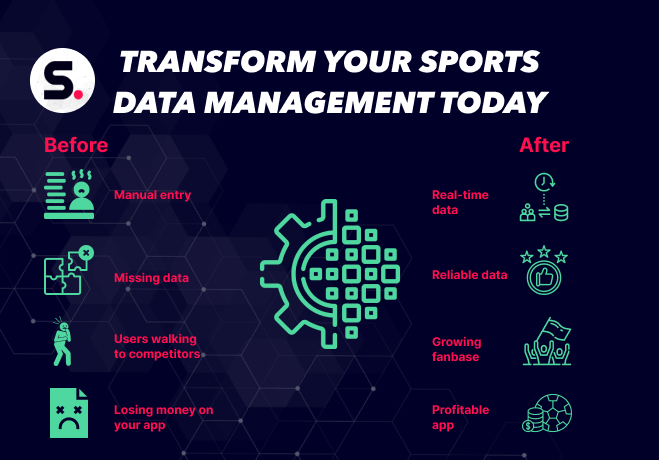
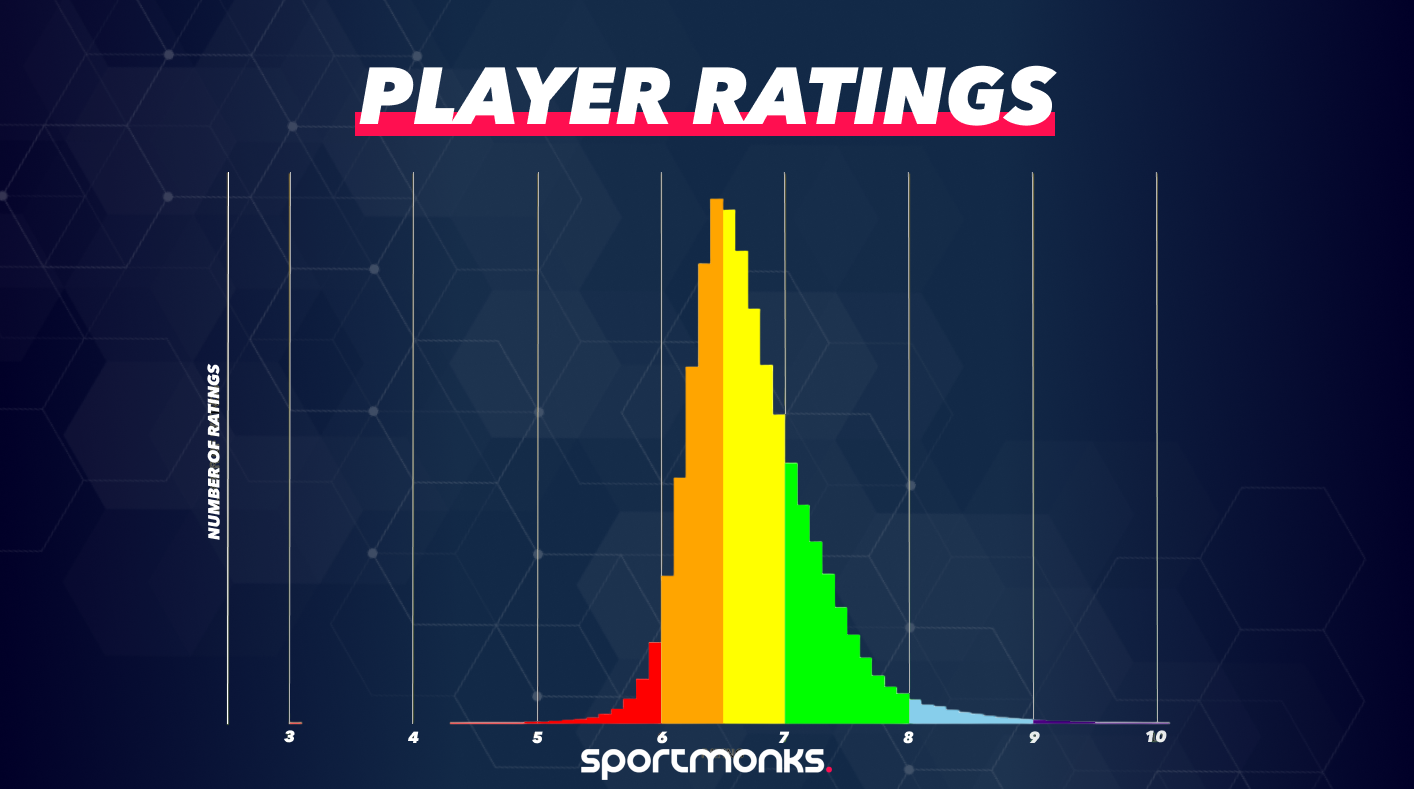
Sportmonks Player Ratings: A Game-Changing Feature in Football Analytics
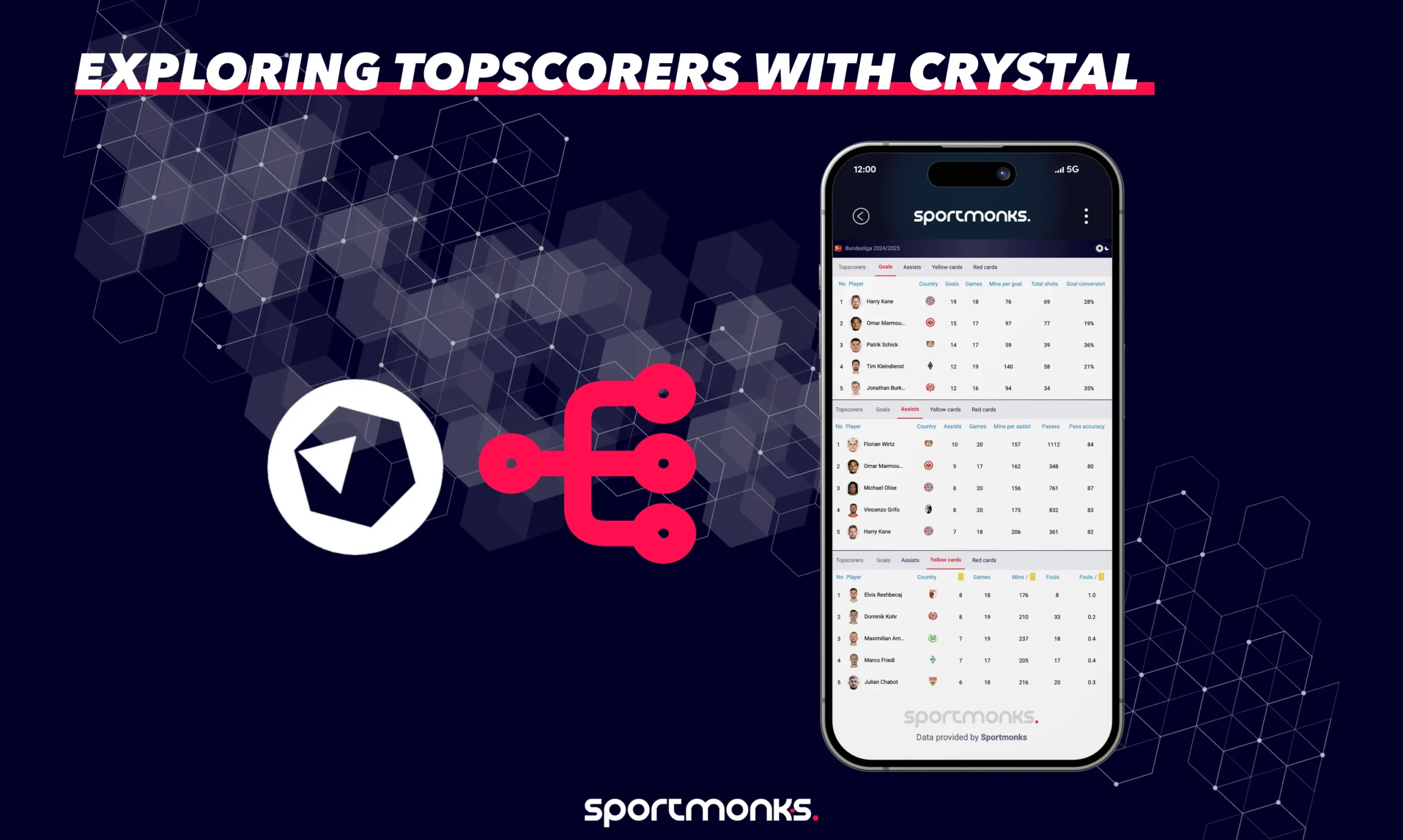
Exploring Top scorers with Sportmonks’ Football API and Crystal
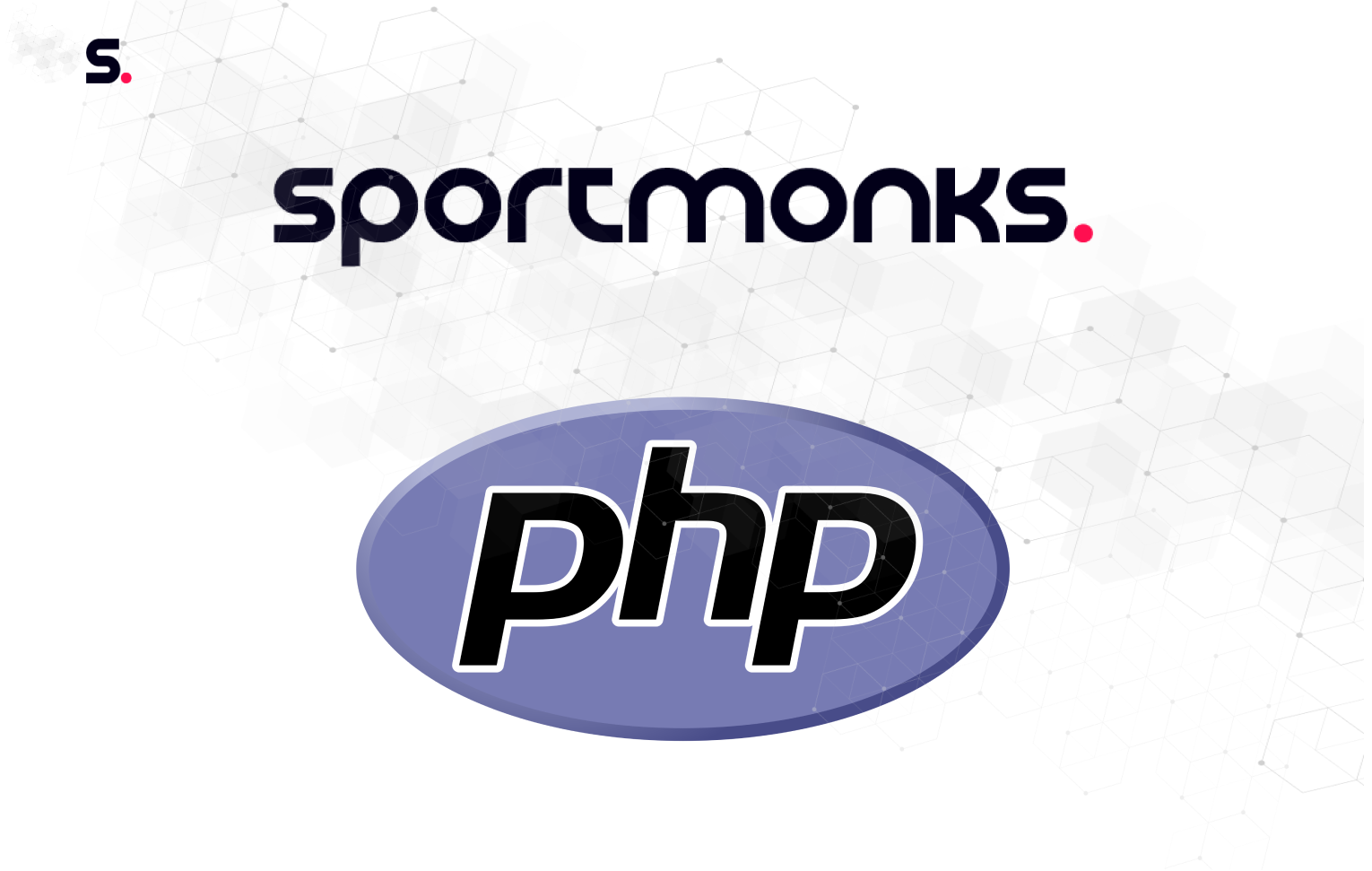
A Developer’s Guide: Unleashing the Potential of Sportmonks Football API with PHP
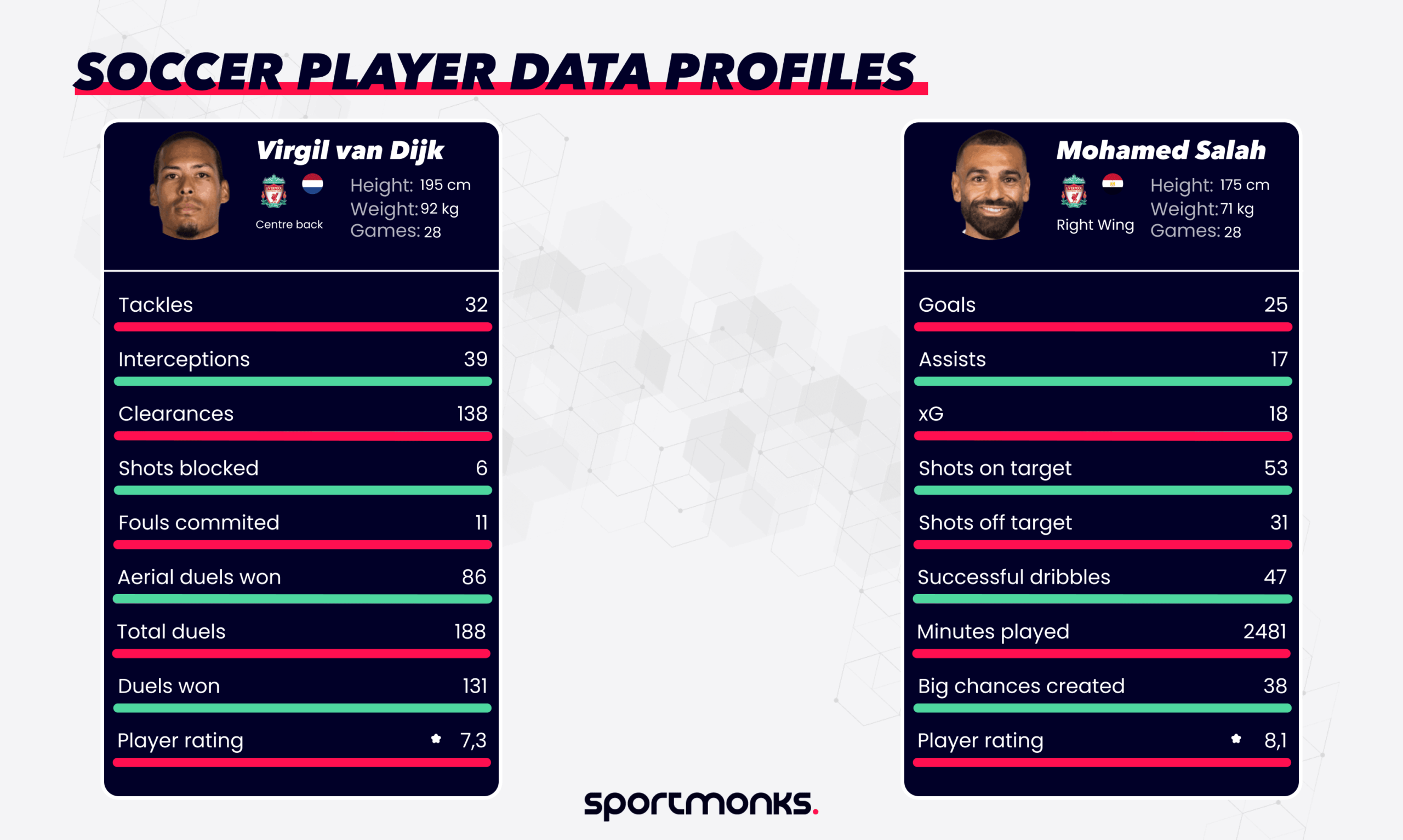
How to Build soccer player data profiles using Sportmonks Football API
